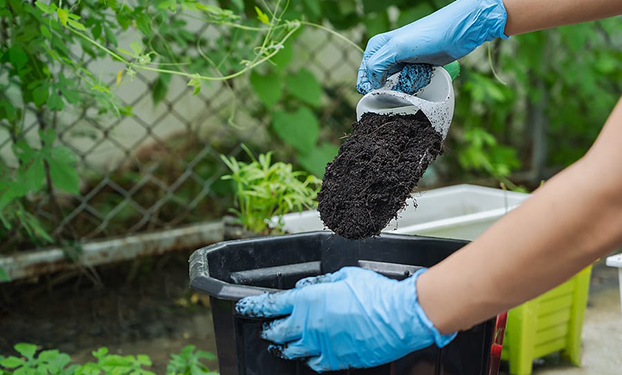Back to garden basics: Fostering the microbiome
Published 5:39 pm Friday, June 28, 2024

- Soil contains a collection of ‘living’ microorganisms (microbiome) which includes bacteria, fungi, algae, and protozoa. These diminutive organisms perform a critical role in soil health: assist in breaking down organic matter, releasing ‘entrained’ nutrients, and suppressing plant diseases (image courtesy: myselectlawn.com).
|
Getting your Trinity Audio player ready...
|
Our “typical” summer weather pattern seems to have returned: hot and humid, intermixed with periods of afternoon showers every few days. What a difference a year makes! All plants but most of all, trees need this “return to normalcy” and hopefully the typical summer weather pattern will remain. It can be uncomfortable working outdoors during the summer months: timing is essential. My personal preference is to perform gardening chores immediately after it rains (temperature drops considerably) or during morning hours (before 10 a.m.), and late evening (after 6 p.m.) for lawn maintenance tasks. Heat stress is a real concern for gardeners. It is important that we take frequent breaks (in shady areas), drink fluids (other than coffee), wear loose-fitting clothing (light colored), and apply sunscreen (exposed areas) for protection.
Most plants share common, basic conditions to survive-soil, sun, and water. There are other necessary requisites needed as well to allow plants to thrive. The vast number of plants require soil to grow and flourish (with exceptions), regardless of size, annual or perennial, flowering or not. Sadly, soil tends to be one of the most overlooked elements new and seasoned gardeners alike don’t take seriously. There are gardeners who purchase the most inexpensive soil available. Seasoned gardeners have learned through experience to appreciate the value of a “robust” soil medium which is more expensive. Good quality soil can make a difference in a successful gardening experience versus a poor soil mix, which most often leads to plant failure.
I’ve noted this year’s harvest (beans, tomatoes, peppers, potatoes, cucumbers, squash, okra, etc.) hasn’t been as good as in previous years, which can be an indication of soil quality (soil test needed) in raised beds. Soil samples will be sent to Texas A&M for analysis (confirmation) though I’m certain the poor harvest is due to diminished soil quality as the raised beds remain in production year-round and are never allowed time to rest. Gardeners, it is important to note my raised beds are amended multiple times per year – top dressed in composted livestock manure, quality potting mixes, and mulch. Insect populations can concentrate in raised beds (root-knot nematodes, squash vine borers, leaf-footed bugs, grubs, and many others).
Fun Fact: There exists more life in soil than anywhere else on earth.
The soil microbiome is a complex, diverse community of organisms which perform a vital role in plant health and nutrient uptake. Plants are dependent on the soil microbiome to obtain essential nutrients, resist disease, and adapt to changing environments. The microbiome also provides food and shelter for earthworms and insects. A healthy microbiome is central for maintaining a productive garden since it improves soil structure, increases water retention, and promotes plant growth.
All gardeners are familiar with terms such as pH, humus, and microbes. But do you know what the terms really mean? Or how they affect the soil?
pH: Time for a basic chemistry refresher (pun intended). pH is an expression (logarithmic value) used to describe the acidity or alkalinity of a solution which is based on a logarithmic scale, where 7.0 in neutral with lower values being more acidic and higher values being more alkaline. Different plants require soil with different pH ranges. Why? Nutrients “move” at distinctive rates through the soil with more acidic soil having a faster rate. If an acid-loving plant (blueberry or azalea) is planted in alkaline soil, it cannot receive nutrients at a fast enough rate. Applying fertilizer will not help since the soil pH is too high, minimizing availability-restricting it from moving through the soil and ‘starving’ the plant. Understanding soil pH is the main reason to have soil tested initially before planting, then again at three-year intervals. The soil analysis report provides a range of information including amendments needed for growing plants of choice. It is always best to gather soil samples and have soil analyzed through your local county extension office or contact Texas A&M AgriLife Extension Services.
Humus is finished compost which is an organic matter providing beneficial microbes and nutrients. Humus can absorb four to five times more moisture than clay soil while storing it and making nutrients more easily available to plants. Humus reduces nutrient leaching and reduces the need for additional fertilizer. Humus performs an important role in reducing soil erosion, another reason to compost and mulch.
Microbes present in the soil are the key to producing humus and without them organic matter will remain intact requiring a longer time interval to decompose. The initial 2 to 4 inches of good quality garden soil contains almost a billion microbes! It takes many types of organisms (bacteria, algae, fungi) to break down organic material to humus. Humus (compost) is a gardener’s best friend and will help your garden soil thrive, allowing gardeners to reduce or eliminate synthetic fertilizers.
There are many ways to maintain a healthy soil microbiome. Avoid using harsh chemicals which can kill beneficial microorganisms. It’s always better to use sustainable amendments to improve soil health. Using mulch or vegetation can help to maintain a healthy soil microbiome allowing the soil to remain covered, shielding microorganisms from direct sunlight while maintaining soil moisture. Lastly, refrain from tilling or turning the soil too frequently which disrupts the balance of the soil ecosystem and can destroy soil microorganisms. Unfortunately, the fragile collection of organisms is too often distressed by gardening activity. Excessive pesticide use, soil compaction, and over-tilling disrupts the soil biomes’ delicate balance which must be protected.
Over time chemical fertilizers will become salt which is the mortal enemy of the soils’ microbiome. Many gardeners do not realize that using commercial, synthetic fertilizers contain salt which causes soil nutrients to bind together decreasing plant’s ability to uptake nutrients. This causes soil compaction which decreases the activity of beneficial soil microbes and increases the activity of pathogens which cause disease.
Organic fertilizers, such as fish emulsion and seaweed contain zero salts and are more beneficial for soil. Plants are unable to determine if fertilizer is synthetic or organic, but the soil biome can.
Share your comments and questions to Certified Texas Expert Gardner John Green at jongreene57@gmail.com.





